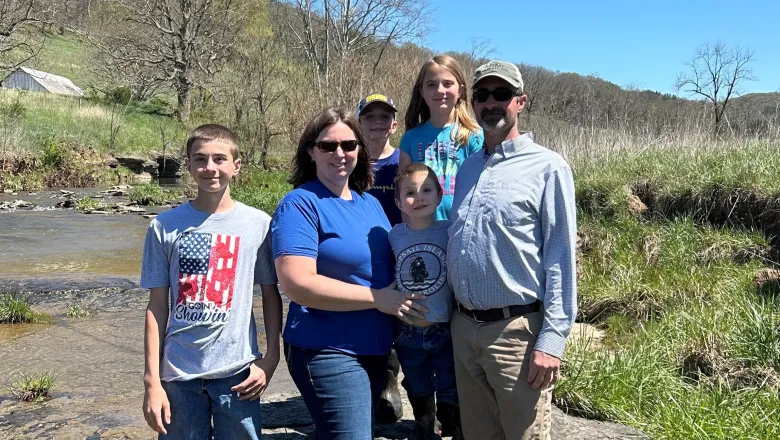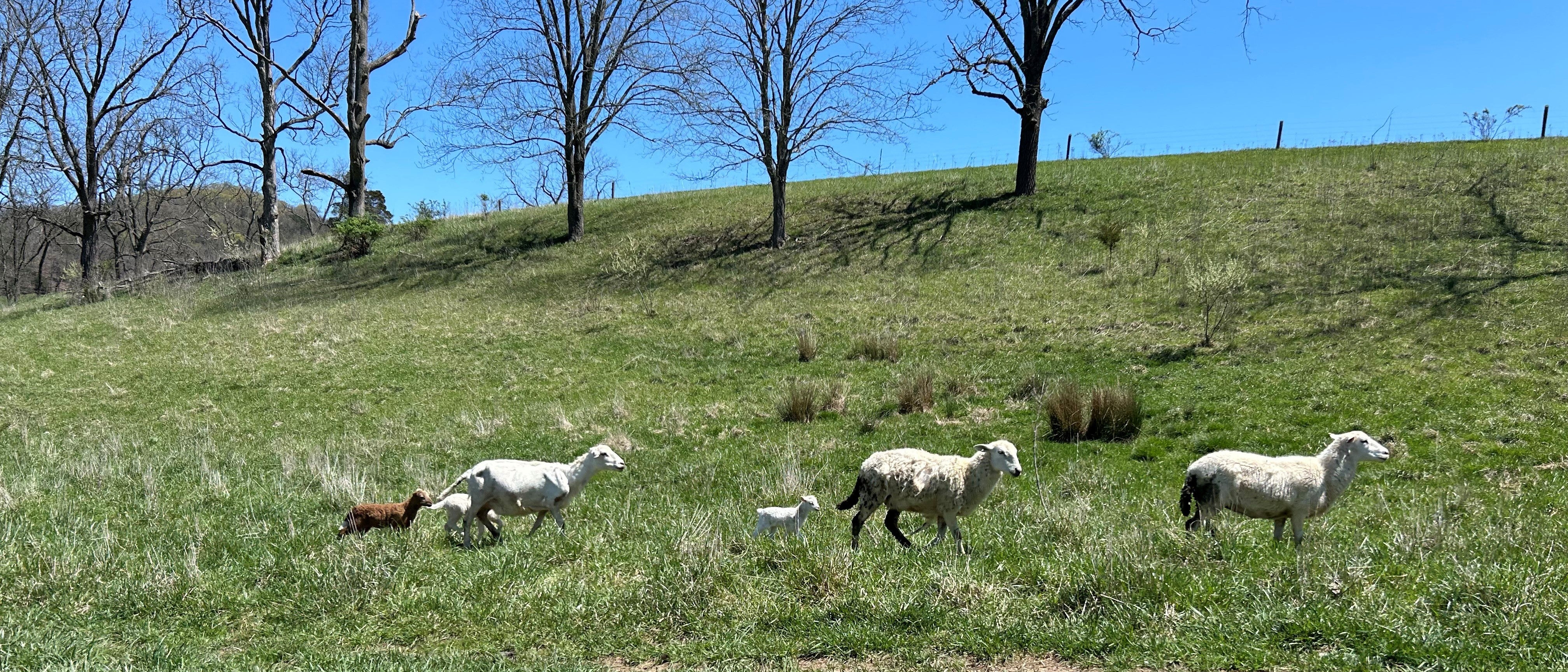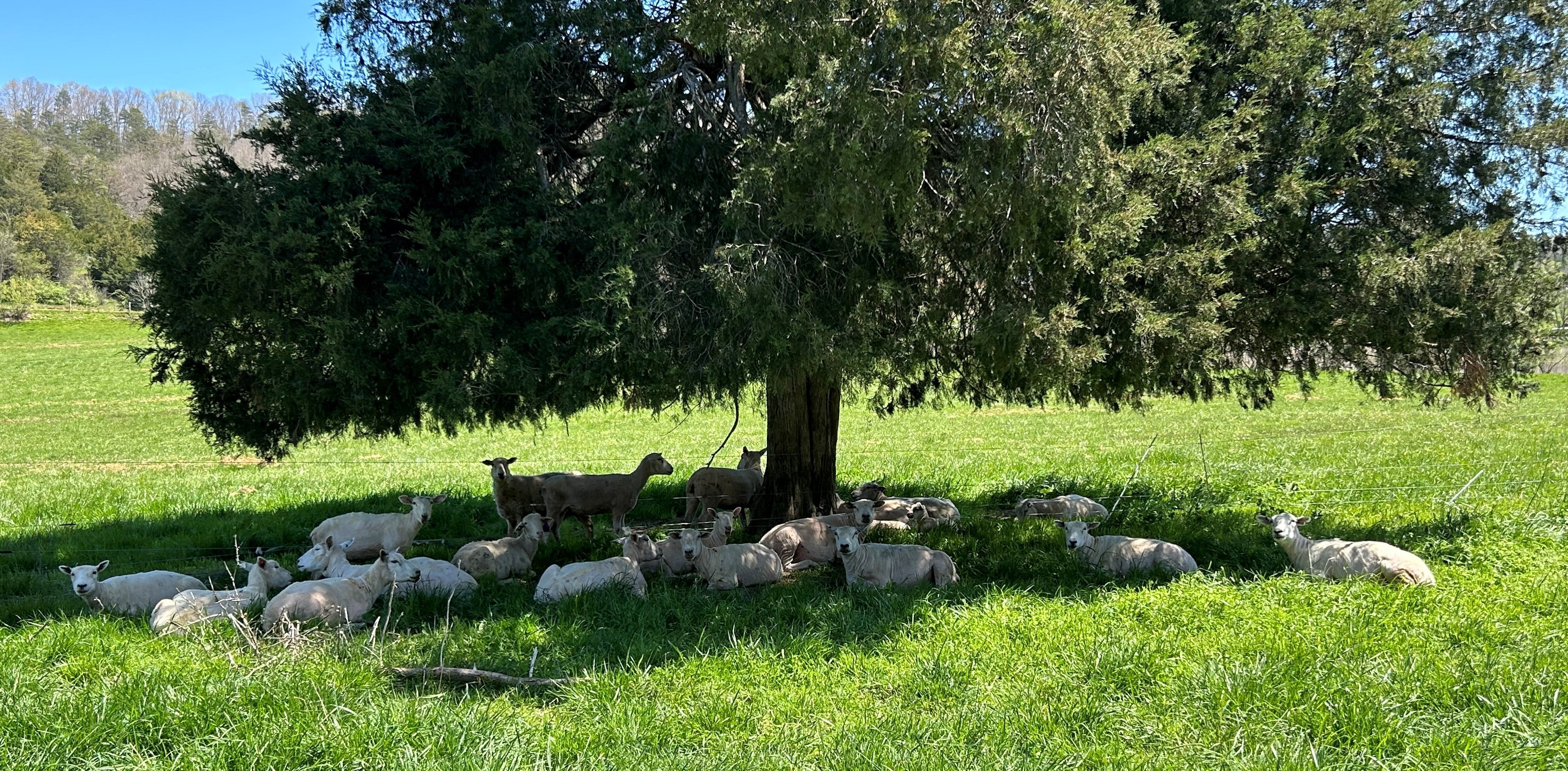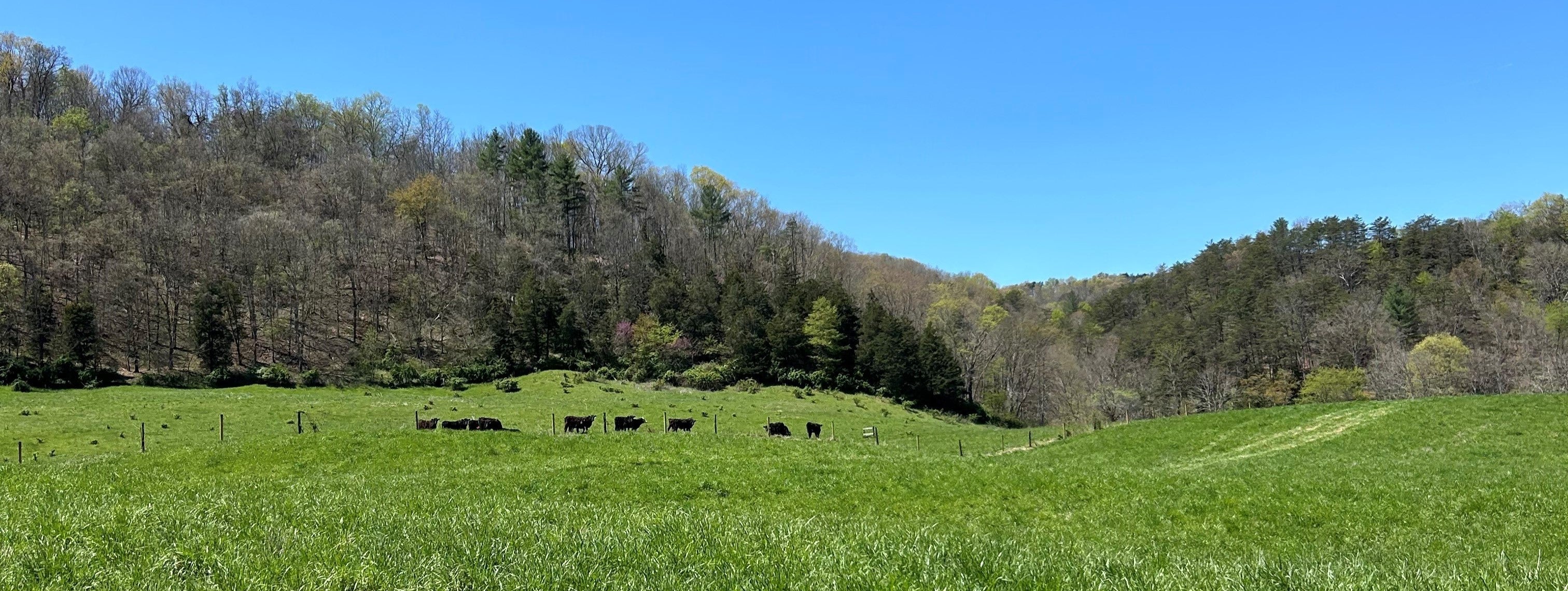Customer Feature: Anathoth Livestock LLC (Monroe County, W. Va.)

Customer Feature Stories
Young, Beginning, Small & Veteran Farmers
Aaron and Tara Helmick run a diversified livestock operation with their four young children called Anathoth Livestock LLC in the beautiful Hans Creek Valley of West Virginia. Both Aaron and Tara have backgrounds in agriculture, though they built this enterprise from the ground up. It started as a dairy and they have since transitioned to sheep and beef cattle.
Aaron and Tara Helmick were married in 2009 and shortly after, decided to start a farm of their own. They began looking at properties and through a friend who was an extension agent, found a farm in Greenville, WV for lease that fit the bill. After an 18-month process of planning, working out the lease agreement and getting the financing in order, the Helmicks were able to milk their first cow on March 13, 2010. They ran their grass-based seasonal dairy, which expanded three times, until January of 2020. Aaron and Tara transitioned away from the dairy for several reasons, though primarily due to labor and lifestyle. With the expansions, the dairy was becoming harder to manage just the two of them. The conversion to an organic dairy required more time in recordkeeping and removed the seasonality of their program. The Helmicks were running at a level of “unsustainable effort” and decided that transitioning the farm to a different commodity focus would allow them to spend more time with their growing family.
About 600 hair sheep (more at times) comprise the core of the Helmicks’ current operation, though they also have a smaller flock of wool sheep, a feeder lamb enterprise and beef cattle. They transitioned to an operation consisting of predominantly sheep for two main reasons: lifestyle and income. Sheep could compete with the dairy income they had previously on the same land base (fewer overhead costs and higher margins) and they knew they wanted their young children to be involved with the farm so beef cattle were a little too big and dangerous for their kids at that point. They also didn’t quite have the borrowing capacity to build the beef herd to the level they’d need to maintain their income level with the amount of land they had. The beef cattle component of the Helmicks’ operation today is done through sell/buy marketing. They buy what’s undervalued and try to sell what’s overvalued, and this is done in a relatively short timeframe, in order to keep overhead costs low. They also offer contract grazing opportunities for other farmers in the area.

Aaron and Tara agree, hands down, that the most rewarding aspect of their business is that they are able to work with their family. They homeschool their four children, so they are actively involved with the operation, as they are able. “We wanted a business where family could be part of it, and it has proven to be a good decision for us,” shared Tara. She continued, “Our children are with us every day and they learn a lot from being there. Plus, we get to spend quality time with them that other people have to give up.” They joked that the children are very willing to go to Grandma’s house sometimes, to get a break from the farm. “They do work hard, but they’re very capable. It’s amazing what they can do,” said Aaron.
Because they have made the commitment to work with their family, the Helmicks are very motivated to keep improving their farm to ensure it can support their family. “The farm has to pay a sustainable, comparable income to what we could make from off-farm jobs with our education and experience levels,” Tara shared, “We look at our profitability annually and analyze what we could be doing, what it’s worth and we make the choice again every year, to make the farm work.”
As far as building a legacy, the Helmicks believe the legacy is their children, not the piece of land or the business. “It’s what we are able to teach the kids and instill in them right now, while they’re here on the farm with us. My goal is for them to be productive citizens and be able to contribute to the community,” said Tara. “When they leave here, life should be easier,” added Aaron, “If they go to work for somebody else or have a business of their own, we want them to be curious, know how to learn and know how to work.”

When the Helmicks first transitioned to sheep, there was a steep learning curve, which was a challenge that they had to overcome. However, Aaron and Tara have gone through some educational trainings, where they have learned to lean into the SWOT (strengths, weaknesses, opportunities, threats) analysis, so they try not to view hurdles as challenges, but rather opportunities for growth and improvement. “We’ve tried to change our attitude on challenges – we try to look at them and see the opportunity. How can we solve this problem for someone else or for ourselves?” said Aaron. He went on, “I think the biggest challenge we’ve faced in this whole journey is people, and I don’t mean labor. We’ve always been focused on our business, but really didn’t understand the importance of daily interactions with people and building strong relationships.” Aaron quoted a saying his mentor uses: “Every problem is a people problem; thereby every solution is a people solution.” Therefore, the Helmicks have an ongoing commitment to build strong working relationships with everyone they come in contact with, including their landlords, extension agents, lenders, service providers, livestock markets, and more.
Farming is one of the most challenging careers out there, especially for folks just getting started in the industry. As beginning farmers, Aaron and Tara admired the Amish practice where startup operators and younger generations are encouraged to first invest in assets that produce a cash return within a short timeframe, then assets that make work more efficient and produce returns in a mid-range timeframe, before finally purchasing the land after all of those early investments are cash flowing. Aaron noted that it was helpful for them to focus primarily on producing and managing cash flow, rather than the agonizing over the balance sheet when they were getting started. Looking back, Aaron and Tara said that the mistakes they made became valuable lessons that helped them grow and take more ownership making improvements for their operation.
The Helmicks’ relationship with Farm Credit began in 2017 with a real estate loan, and they are grateful to their Farm Credit loan officer for helping them get through the major transition from dairy to sheep as seamlessly as possible. Their loan officer was there to help them through the process with patience and understanding. They appreciate the educational events and resources offered through the Farm Credit Knowledge Center, as well.

As for the future of Anathoth Livestock, Aaron and Tara are continuing to hone their skills when it comes to managing a business, while trying to put people and relationships at the top of the priority list. Their current operation has a lot of moving parts, but it is simplified and more flexible than the dairy, which allows them to focus more on their family life and their four active children. However, the business will be entering a strategic building phase in the next two to three years. Aaron and Tara have plans to change their business model, with the production aspect shrinking and the breeding and sell/buy marketing components growing. They also plan to leverage the relationships they’ve built with farmers and professionals in the ag community across the country in order to help other young farmers just getting started in the industry. They are appreciative of the support they’ve received over the years, so they hope to turn the tables by helping to educate other young farmers and share best practices and tools for smart growth.
This feature story was published in the June 2024 Leader Magazine. Access the full magazine (digital version) HERE.